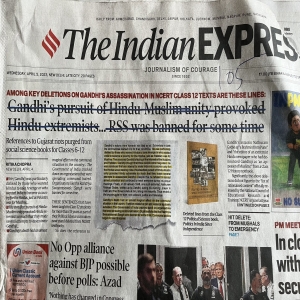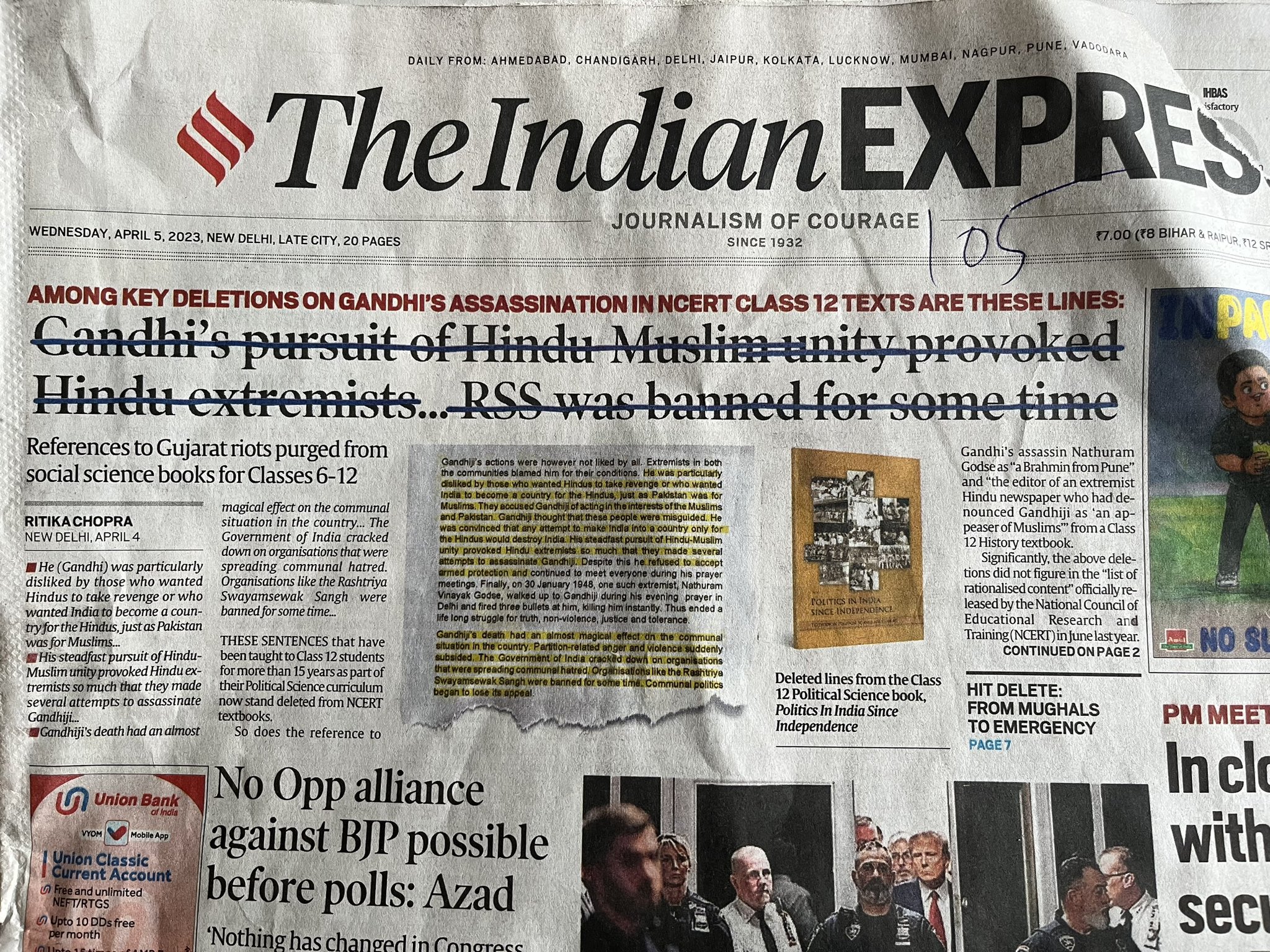

The Bharatiya Janata Party (BJP)-led National Democratic Alliance (NDA) government in India has been at the forefront of a concerted effort to reshape the nation's historical narrative through a process often referred to as "historical revisionism." This endeavour seeks to reinterpret India's past in a manner that aligns with the ideological tenets of Hindutva, the political ideology espoused by Rashtriya Swayamsevak Sangh (RSS), the BJP's ideological parent. Central to this revisionist agenda is the promotion of a patriotic nationalism that emphasises Hindu cultural supremacy while marginalising the contributions and experiences of other communities, particularly Muslims and Dalits.
The Ideological Foundations of Historical Revisionism
At the heart of the BJP's historical revisionism lies the ideology of Hindutva, articulated by Vinayak Damodar Savarkar in the 1920s. Hindutva posits that India is fundamentally a Hindu nation and that Indian culture is synonymous with Hindu culture. This worldview inherently marginalises the pluralistic and syncretic aspects of Indian history, which have been shaped by centuries of Muslim, Sikh, Christian, and other influences. Under the BJP's governance, this ideology has been institutionalised through various state mechanisms, including education, media, and political discourse.
Rewriting School Curricula: The Saffronisation of Education
One of the most significant arenas for the BJP's historical revisionism has been the education system. The National Council of Educational Research and Training (NCERT), responsible for developing textbooks for schools across India, has played a crucial role in this process. Under the BJP-led government, NCERT textbooks have undergone several revisions that critics argue serve to promote a Hindutva-centric view of history.
For instance, in 2023, the NCERT removed the sole chapter dedicated to Mughal history from its Class 12 history textbook. This omission effectively erased a significant period of Indian history, during which the Mughals ruled large parts of the subcontinent and contributed to its cultural and architectural heritage. Similarly, references to the 2002 Gujarat riots, which occurred under then-Chief Minister Narendra Modi's watch, have been expunged from textbooks, thereby sanitising a contentious chapter in contemporary Indian history.
Moreover, the BJP has promoted the inclusion of content that glorifies figures associated with the Hindutva ideology. In Rajasthan, for example, state-sponsored textbooks have elevated Vinayak Damodar Savarkar, a prominent Hindutva ideologue, to a status comparable to that of Mahatma Gandhi and Jawaharlal Nehru in the national freedom struggle. This portrayal overlooks Savarkar's controversial actions during the independence movement, including his petitioning for clemency from the British and his alleged involvement in the conspiracy to assassinate Mahatma Gandhi.
These curricular changes are not limited to history alone. Science and social studies textbooks have also been infused with content that aligns with Hindu religious narratives. For example, environmental science textbooks have linked the lotus flower to the Hindu goddess Saraswati, and geography lessons have incorporated stories from Hindu scriptures. Such inclusions blur the lines between religious belief and scientific fact, promoting a worldview that prioritises Hindu mythology over empirical knowledge.
The Marginalisation of Muslim and Dalit Contributions
A central aspect of the BJP's historical revisionism is the deliberate downplaying or erasure of the contributions of Muslims and Dalits to Indian society. The Mughal Empire, which ruled large parts of India for several centuries, is often portrayed negatively in BJP-aligned narratives. The demolition of the Babri Masjid in 1992, an event that was supported by BJP leaders, is framed as a justified act of reclaiming Hindu heritage despite its historical and cultural significance to Muslims.
Similarly, Dalit leaders and reformers who challenged the caste system and fought for social justice are frequently omitted or marginalised in the revised historical narratives. This omission serves to perpetuate a Brahminical view of history that overlooks the struggles and contributions of lower-caste communities.
The Role of Media in Promoting Historical Revisionism
The BJP has also leveraged the media to propagate its revised version of history. The term "Godi Media" has been coined to describe television channels and news outlets that are perceived to be sympathetic to the BJP and its agenda. These media platforms often disseminate narratives that align with Hindutva ideology, portraying the BJP as the sole defender of Hindu culture and civilisation. This media landscape plays a crucial role in shaping public perceptions of history and identity, reinforcing the government's revisionist narratives.
Political Implications and Democratic Concerns
The BJP's historical revisionism extends beyond education and media; it has significant political implications as well. By promoting a singular, Hindu-centric narrative of Indian history, the BJP seeks to consolidate its political base among Hindu voters while marginalising minority communities. This strategy not only distorts the past but also influences present-day politics, fostering an environment where dissent is viewed as unpatriotic and where alternative historical perspectives are suppressed.
Critics argue that this approach undermines the pluralistic foundations of Indian democracy. By promoting a homogeneous national identity rooted in a selective and often distorted version of history, the BJP risks alienating the diverse communities that constitute the Indian populace. This exclusionary nationalism poses a threat to the democratic values of inclusivity and tolerance.
International Parallels: The Case of Poland
The BJP's historical revisionism mirrors similar trends in other parts of the world, notably in Poland. According to Carol Schaeffer, a Berlin-based journalist and senior fellow at the Atlantic Council in Washington, D.C., writing in The Telegraph, in 2025, Karol Nawrocki, a conservative historian with no prior political experience, was elected president of Poland. Nawrocki, who had previously led the Institute of National Remembrance (IPN), a body responsible for overseeing Poland's communist-era history, has been a proponent of historical revisionism. Under his leadership, the IPN promoted a narrative that emphasised Polish victimhood during World War II while downplaying instances of Polish collaboration with Nazi forces. This selective memory has been institutionalised through changes to school curricula, increased surveillance of dissenting historical research, and the promotion of commemorative events that reinforce a heroic, innocent narrative of Polish history (The Telegraph, "Clio's Captors," Kolkata, June 10, 2025).
Nawrocki's rise to the presidency highlights the deep-seated nature of historical revisionism in Polish political life and its potency as a tool for the far right across Europe. His political appeal lies in his refusal to accept collective moral ambiguity, offering a version of Poland where the nation was always victimised, always noble, and never wrong. This historical self-image has become central to Poland's political identity, posing a challenge to efforts aimed at restoring democratic norms and the rule of law.
This parallel highlights the global nature of the phenomenon and the potential dangers of historical revisionism when employed as a tool for political consolidation.
The BJP's historical revisionism represents a concerted effort to reshape India's past in a manner that aligns with the ideological tenets of Hindutva. Through the manipulation of educational curricula, media narratives, and political discourse, the government seeks to promote a singular, Hindu-centric view of history that marginalises the contributions and experiences of other communities. While this strategy may serve to consolidate the BJP's political base, it poses significant risks to India's pluralistic and democratic fabric. As India continues to grapple with its diverse heritage, it is crucial to uphold a historical narrative that acknowledges the complexities and multiplicities of its past, fostering an inclusive national identity that reflects the contributions of all its people.